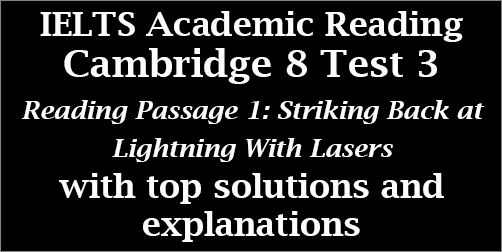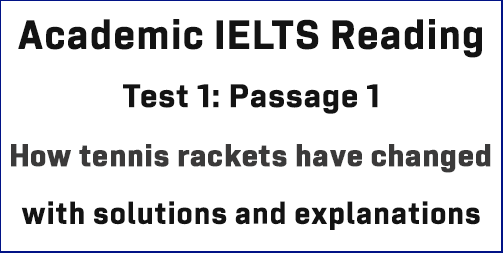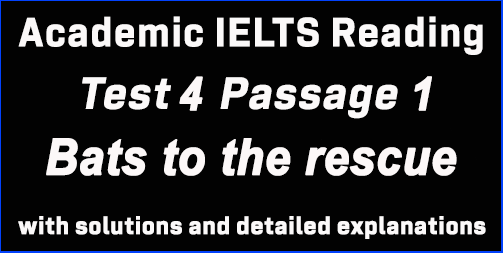IELTS Academic Reading: Cambridge 8, Test 3: Reading Passage 1; Striking Back at Lightning with Lasers; with best solutions and step-by step detailed explanations
This IELTS Reading post focuses on all the solutions for IELTS Cambridge 8 Test 3 Reading Passage 1 which is entitled ‘Striking Back at Lightning with Lasers’. This is an aimed post for IELTS candidates who have great problems in finding answers for the Academic Reading module. This post can guide you the best to comprehend each Reading answer without facing much difficulty. Tracing IELTS Reading answers is a gradual process and I sincerely hope this post can help you in your IELTS Reading preparation.
IELTS Cambridge 8 Test 3: AC Reading Module
Reading Passage 1:
The headline of the passage: Striking Back at Lightning with Lasers
Questions 1-5: Multiple choice questions
[This type of question asks you to choose a suitable answer from the options using the knowledge you gained from the passage. Generally, this question is found as the last question so you should not worry much about it. Finding all the answers for previous questions gives you a good idea about the title.]
Question 1: The main topic discussed in the text is –
Keywords for the question: main topic,
A very quick reading (skimming) of the passage will let us know about the following facts:
Paragraph no. 1: Lightning and its adverse effects
Paragraph no. 2: Researchers has found a way to control lightning’s effects with laser
Paragraph no. 3: A project to strike back at lightning survived
Paragraph no. 4: Lightning may change its own course and hit somewhere else
Paragraph no. 5: Research needs to be risk-free
Paragraph no. 6: How the new research idea may work and be used in events
Paragraph no. 7: The mammoth size of the laser
Paragraph no. 8: The much needed money for producing the laser at a cheaper price
Paragraph no. 9: The project can be helpful for other scientists and experts
Paragraph no. 10: The laser has a good chance to work against hailstorms
Now, we can decide that option A is not a match because this passage is not about the damage lightning does to US golf course and players; option B is not a match because the passage does not talk about supplying power to US and Japan; and option C is not a match because we find only one way of trying to control lightning strikes.
Option D is our answer as the main topic is ‘A laser technique that may work to control lightning strikes.
So, the answer is: D (a laser technique used in trying to control lightning strikes.)
Special tip: As the question asks to find out the main topic of the passage, this question should be answered after all the 12 questions of this passage.
Question 2: According to the text, every year lightning –
Keywords for the question: every year, lightning,
Take a look at the last lines of paragraph A, “. . .. And there is damage to property too. Lightning damage costs American power companies more than $100 million a year.” This means that every year lightning causes a great amount of damage to buildings.
Here, damage to property = damage to buildings, a year = every year,
So, the answer is: A (does considerable damage to buildings during thunderstorms.)
Question 3: Researchers at the University of Florida and at the University of New Mexico –
Keywords for the question: Researchers, University of Florida, University of New Mexico,
The answer can be found in two paragraphs.
First take a look at lines 3-5 of paragraph no. 3, “The technique survives to this day at a test site in Florida run by the University of Florida, with support from the Electrical Power Research Institute (EPRI), based in California.” So, Researchers at the University of Florida receive funds from EPRI.
Now, go to paragraph no. 5 and look at lines 2-3, “. . . points out Jean-Claude Diels of the University of New Mexico. Diels is leading a project, which is backed by EPRI,. .. .” So, researchers at the University of New Mexico also receive funds from EPRI.
So, the answer is: A (receive funds from the same source.)
Questions 4-6: (Completing sentences with NO MORE THAN TWO WORDS)
[For this type of question, candidates need to complete the sentences with NO MORE THAN TWO WORDS from the passage. Candidates need to look for keywords in the sentence beginnings and find the relative paragraphs and then sentences in the passage. Skimming and scanning, both reading skills are essential for this question type.]
Question 4: EPRI receives financial support from ______________.
Keywords for the question: EPRI receives, financial supports,
Have a close look at paragraph no. 3, lines 5-6, “. . . .. with support from the Electrical Power Research Institute (EPRI), based in California. EPRI, which is funded by power companies, . . .. .”
Here, funded by means receives financial support from,
So, the answer is: power companies
Question 5: The advantage of the technique being developed by Diels is that it can be used ____________.
Keywords for the question: advantage, technique, Diels, can be used,
In paragraph no. 5, lines 2-4 say, “. …. .. points out Jean-Claude Diels of the University of New Mexico. Diels is leading a project, which is backed by EPRI, to try to use lasers to discharge lightning safely- and safety is a basic requirement since no one wants to put themselves or their expensive equipment at risk.”
So, the answer is: safely (you must use the adverb form of the noun ‘safety’)
Question 6: The main difficulty associated with using the laser equipment is related to its ____________.
Keywords for the question: main difficulty, using the laser equipment, related to,
In paragraph no. 7, the writer talks about the main problem related to the laser equipment. “However, there is still a big stumbling block. The laser is no nifty portable: it’s a monster that takes up a whole room. Diels is trying to cut down the size and says that a laser around the size of a small table is in the offing.”
Here, big stumbling block = main difficulty, it’s a monster that takes up a whole room = size,
So, the answer is: size
Questions 7-10: (Completing summary with a list of words)
[In this type of question, candidates are asked to complete a summary with a list of words taken from the passage. Candidates must write the correct letter (not the words) as the answers. Keywords and synonyms are important to find answers correctly. Generally, this type of question maintains a sequence. Find the keywords in the passage and you are most likely to find the answers.]
Question no. 7: In this method, a laser is used to create a line of ionisation by removing electrons from __________.
Keywords for the question: laser, used, create, a line of ionisation, removing electrons from,
In paragraph no. 6, the author of the passage writes in lines 1-4, “The idea began some 20 years ago, when high-powered lasers were revealing their ability to extract electrons out of atoms and create ions. If a laser could generate a line of ionisation. .. ..”
Here, generate a line of ionisation = create a line of ionisation, removing electrons from = extract electrons out of,
So, the answer is: B (atoms)
Question no. 8 and 9: This laser is then directed at 8. __________ in order to control electrical charges, a method which is less dangerous than using 9. __________.
Keywords for the question: laser, directed, control electrical charges, a method, less dangerous than,
Again, in paragraph no. 6, carefully look at lines 2-3, “If a laser could generate a line of ionisation in the air all the way up to a storm cloud, this conducting path could be used to guide lightning to Earth . … . ”
Now, paragraph no. 6 is an explanation of using lasers in a populated area by Jean-Claude Diels of the University of New Mexico. If you take a look at the first line of paragraph no. 5, you’ll find the reason for using lasers, “And anyway, who would want to fire streams of rockets in a populated area?”
This means lasers are less dangerous than rockets.
So, the answers are:
- C (storm clouds)
- G (rockets)
Question no. 10: As a protection for the lasers, the beams are aimed firstly at __________.
Keywords for the question: protection, for the lasers, beams, aimed firstly,
For this question, we have to look at lines 5-6 of paragraph no.6, “. . .. To stop the laser itself being struck, it would not be pointed straight at the clouds. Instead it would be directed at a mirror and from there into the sky”.
So, mirrors will give the much needed protection for the lasers.
Here, directed at = aimed . . . at,
So, the answer is: D (mirrors)
Questions 11-13: YES, NO, NOT GIVEN
[In this type of question, candidates are asked to find out whether:
The statement in the question agrees with the claims of the writer in the passage – YES
The statement in the question contradicts the claims of the writer in the passage – NO
If there is no information on this – NOT GIVEN
For this type of question, you can divide each statement into three independent pieces and make your way through with the answer.]
Question 11: Power companies have given Diels enough money to develop his laser.
Keywords for this question: power companies, given, Diels, enough money, to develop his laser,
In paragraph no. 8 the writer says in lines 1-3, “Bernstein says that Diels’s system is attracting lots of interest from the power companies. But they have not yet come up with the 5 million dollars that EPRI says will be needed to develop a commercial system…”.
This means even though power companies are fascinated by Diels’s system, they have not yet provided him with the money that he needs.
So, the answer is: NO
Question 12: Obtaining money to improve the lasers will depend on tests in real storms.
Keywords for this question: obtaining money, improve the lasers, depend on, tests, real storm,
In paragraph no. 8, lines 3-6 the author says, “He reckons that the forthcoming field test will be the turning point – and he’s hoping for good news. Bernstein predicts ‘an avalanche of interest and support’ if all goes well. He expects to see cloud – zappers eventually costing 50,000 dollars to 100,000 dollars each.”
Here, the forthcoming field test will be the turning point indicates that the coming tests in real storms will determine whether he will obtain the money or not.
So, the answer is: YES
Question 13: Weather forecasters are intensely interested in Diels’s system.
Keywords for this question: Weather forecasters, intensely interested, Diels’s system,
We find the mention of ‘meteorology’ in both paragraphs no. 9 and 10. However, neither of the paragraphs indicates anything about weather forecasters’ interest in Diels’s system.
So, the answer is: NOT GIVEN
Click here for solutions to Cambridge 8 Test 3 Reading Passage 2
Click here for solutions to Cambridge 8 Test 3 Reading Passage 3




2 thoughts on “IELTS Academic Reading: Cambridge 8, Test 3: Reading Passage 1; Striking Back at Lightning with Lasers; with best solutions and step-by step detailed explanations”